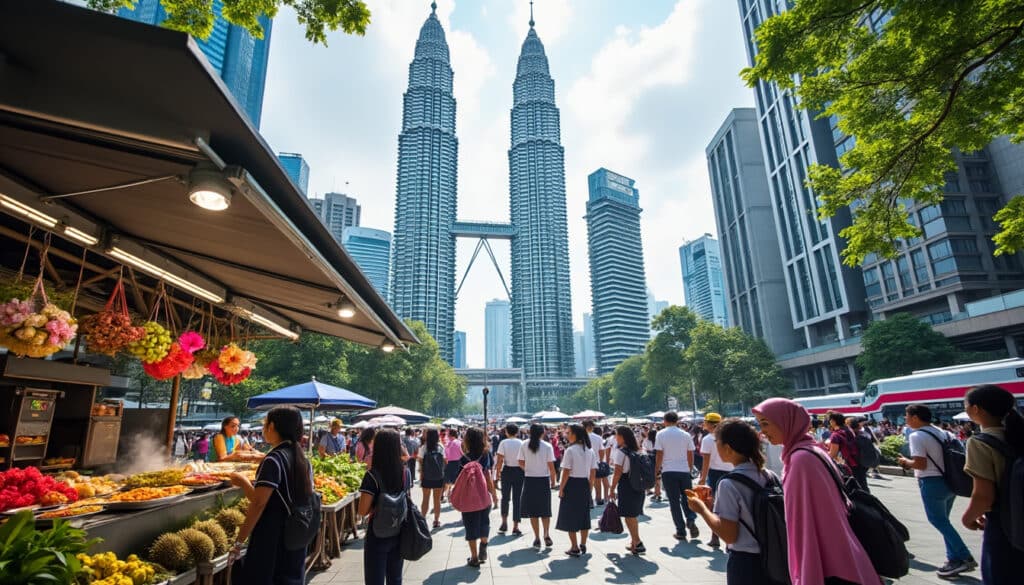Kuala Lumpur, a vibrant metropolis, stands as a testament to the harmonious blend of history, culture, and modernity. The cityscape is elegantly punctuated by towering skyscrapers, each reflecting the diverse tapestry of influences that have shaped the city’s architectural marvels. From the iconic Petronas Towers to the historical Sultan Abdul Samad Building, the urban landscape of Kuala Lumpur is a treasure trove of stories waiting to be discovered. As a melting pot of cultures, the city’s architecture is not just about buildings; it’s about the expression of a multicultural identity where the past and the future coexist in perfect harmony.
The Iconic Skyscrapers of Kuala Lumpur
Kuala Lumpur’s skyline is dominated by some of the world’s most renowned skyscrapers that stand as global symbols of architectural achievement. Among these, the Petronas Twin Towers are perhaps the most iconic, having been the tallest buildings in the world from 1998 to 2004. Rising to a height of 452 meters, they are not merely structures of steel and glass; they encapsulate the spirit of modern Malaysia, showcasing Islamic motifs fused with cutting-edge engineering.

Adjacent to them is the Menara Kuala Lumpur, commonly referred to as the KL Tower. This telecommunications and broadcasting tower, at 421 meters, is famed for its panoramic views over the city. It serves both as a vital communications hub and a major tourist attraction with its revolving restaurant that offers diners a 360° view of the sprawling metropolis below.
The recently completed Merdeka 118 has now joined the ranks, redefining the city’s skyline. This awe-inspiring structure stands at an impressive 644 meters, making it one of the tallest buildings in Southeast Asia. Merdeka 118 represents not just engineering brilliance but also reflects Malaysia’s dedication to sustainable and green architecture with state-of-the-art energy-efficient technologies.
These towering giants are more than mere buildings; they embody the aspirations of a rapidly modernizing nation determined to stake its place on the global stage. The collaboration between international architects and local cultural influences creates a distinctive skyline that is a beacon of innovation and tradition.
Colonial Architecture: A Glimpse into the Past
The remnants of British colonial rule are still visible in Kuala Lumpur through its preserved colonial architecture. The Sultan Abdul Samad Building, one of the city’s most famous colonial-era icons, stands majestically in front of the Merdeka Square. Its Moorish-style architecture, marked by domes and arches, reflects the eclectic style prevalent during the turn of the 20th century, blending Indo-Saracenic and Mughal elements.
Central Market Kuala Lumpur, once a simple wet market, is another architectural gem from the colonial period. Today, it serves as a cultural hub, attracting visitors with its art galleries, traditional craft stores, and diverse food stalls representing Malaysia’s rich cultural tapestry. The adaptation of colonial buildings into functional modern spaces is a testament to the city’s ability to preserve its history while embracing modernity.
Moreover, the Gothic and Neo-Classical influences are palpable in various old structures like the Kuala Lumpur Railway Station, which evokes the charm of a bygone era with its whitewashed façade and onion-shaped domes. These buildings not only provide a window into history but also serve as poignant reminders of the city’s complex past under colonial rule.
The Influence of Cultural Diversity
Kuala Lumpur’s urban landscape is a physical manifestation of its multicultural society. The Islamic Arts Museum Malaysia stands out as a prime example of how Islamic art and culture have influenced local architecture. With its stunning domes and intricate Islamic calligraphy, the museum is a trove of artifacts that celebrates the profound impact of Islam on Malaysian society.
In contrast, the Chinese influence can be seen in areas such as Chinatown, where traditional Chinese shophouses line the bustling streets, filled with dragon motifs and vibrant red lanterns. Here, the architecture serves as a living history of the Chinese community and their significant contributions to Kuala Lumpur’s development.
A blend of Malay, Indian, and European architectural styles is evident throughout the city, each culture leaving its indelible mark. For example, the Pavilion Kuala Lumpur, a high-end shopping complex, incorporates modern design with elements inspired by the diverse cultures that call KL home, making it a symbol of unity and diversity.
- Islamic influences 🕌
- Chinese motifs 🏮
- Indian architecture 🕉️
- Colonial past 🏰
Table: Kuala Lumpur’s Cultural Architecture
| Location | Cultural Influence | Main Features |
|---|---|---|
| Islamic Arts Museum Malaysia | Islamic 🕌 | Domes, Calligraphy |
| Chinatown | Chinese 🏮 | Shophouses, Lanterns |
| Sultan Abdul Samad Building | Colonial 🏰 | Moorish Architecture |
| Little India, Brickfields | Indian 🕉️ | Vibrant Colors, Temples |
Urban Green Spaces
Amidst the bustling urban landscape, KLCC Park provides a breath of fresh air with its 20 hectares of green space in the heart of Kuala Lumpur. Designed to offer a serene retreat from the city’s hustle, the park features a man-made lake, a symphony fountain, and asymmetrical jogging paths. It serves as a green lung, crucial for the environmental and social well-being of those who live and work in the surrounding high-rises.
Urban planning in Kuala Lumpur has increasingly incorporated these green spaces, understanding their importance in balancing the fast-paced development. The harmonious blend of nature with city life is further emphasized by projects like the River of Life, which transformed the once-polluted river areas into vibrant waterfronts.
In addition, the preservation and integration of green spaces are instrumental in providing recreational areas, promoting biodiversity, and mitigating the urban heat island effect. As the city continues to grow, these parks and green zones act as essential buffers – facilitating outdoor activities, enhancing aesthetic value, and contributing significantly to Kuala Lumpur’s sustainability efforts in 2025.
Retail Architecture and Modern Complexes
Shopping centres such as Pavilion Kuala Lumpur and Berjaya Times Square have redefined retail experiences in the city. These structures are not merely commercial; they incorporate art galleries, entertainment hubs, and architectural elements that reflect Kuala Lumpur’s dynamism. Pavilion Kuala Lumpur, with its elegant architecture and open-plan design, is an epitome of high-end retail experiences, offering both locals and tourists an insight into luxury and modern consumer culture.
Berjaya Times Square, meanwhile, is a city within a city, offering a vast array of shops, a theme park, and hotels within its towering structure. It’s a testament to Kuala Lumpur’s status as a leader in retail architecture, where multifaceted complexes cater to the diverse needs of this metropolitan population.
Learn more about shopping in Kuala Lumpur
These modern retail spaces demonstrate how Kuala Lumpur balances sustainability with the necessity for urban expansion. From energy-efficient lighting to the incorporation of eco-friendly materials, these complexes set a standard for responsible urban development, paving the way for future innovations.
Table: Kuala Lumpur’s Prominent Retail Complexes
| Name | Main Attractions | Unique Features |
|---|---|---|
| Pavilion Kuala Lumpur | High-end Retail | Art Galleries |
| Berjaya Times Square | Theme Park 🎢 | Integrated Hotels |
FAQ
- What is the tallest building in Kuala Lumpur as of 2025?
The tallest building is Merdeka 118. - Are there any green spaces in Kuala Lumpur?
Yes, KLCC Park and the River of Life are notable green spaces. - What are some famous colonial buildings in Kuala Lumpur?
Sultan Abdul Samad Building and Central Market are iconic colonial-era structures.
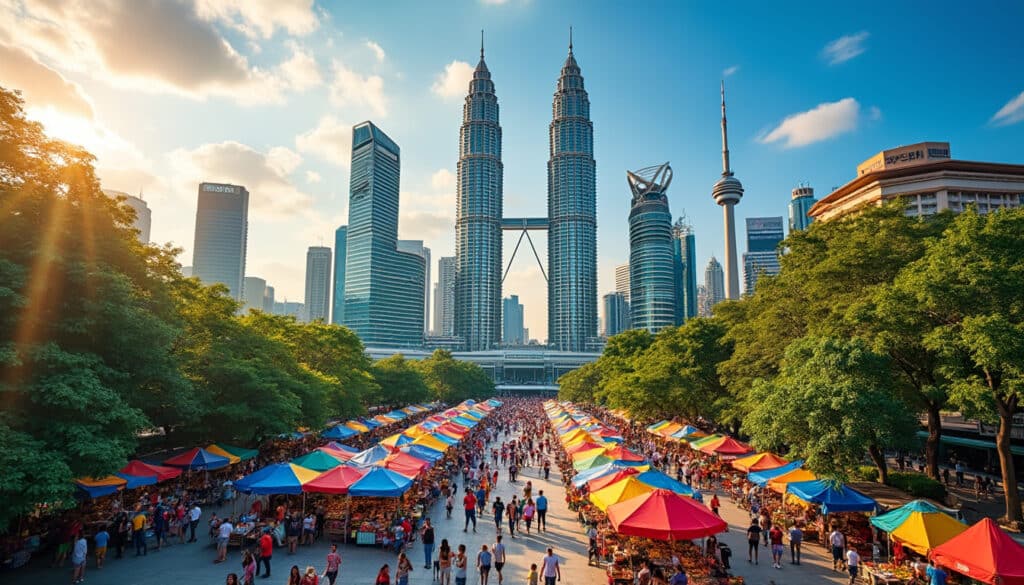
Fun Facts & Curiosities About Kuala Lumpur
Welcome to the multifaceted world of Kuala Lumpur, a city that captivates with its vibrant cultural tapestry and awe-inspiring landmarks. Known for the towering Petronas Twin Towers and its bustling street food scene, Kuala Lumpur stands as a testament to…
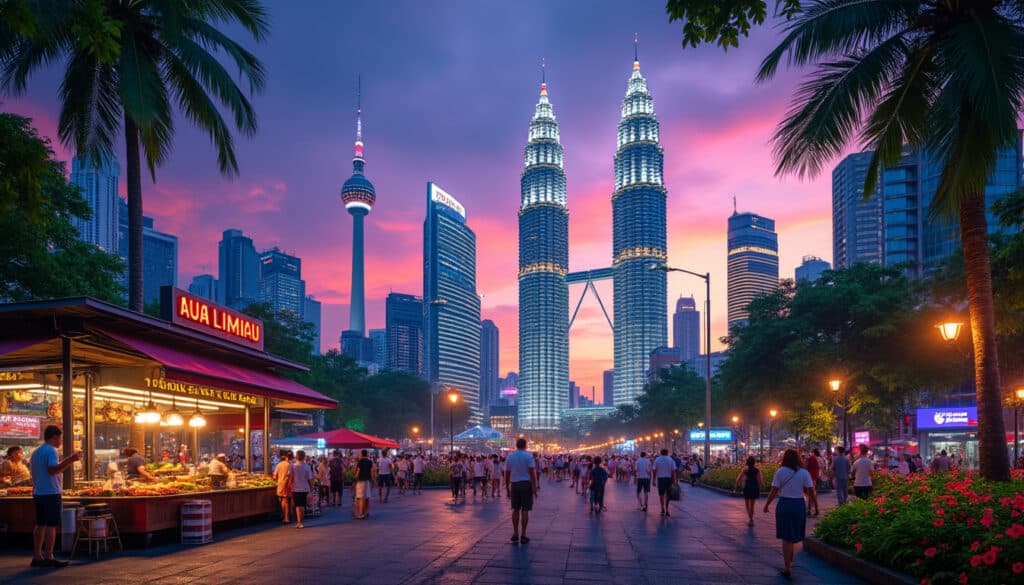
Basic facts about Kuala Lumpur
Kuala Lumpur, a vibrant metropolis and the capital city of Malaysia, is not just a hub of culture and commerce but a melting pot of tradition and modernity. With towering skyscrapers like the Petronas Twin Towers and the historical Batu…
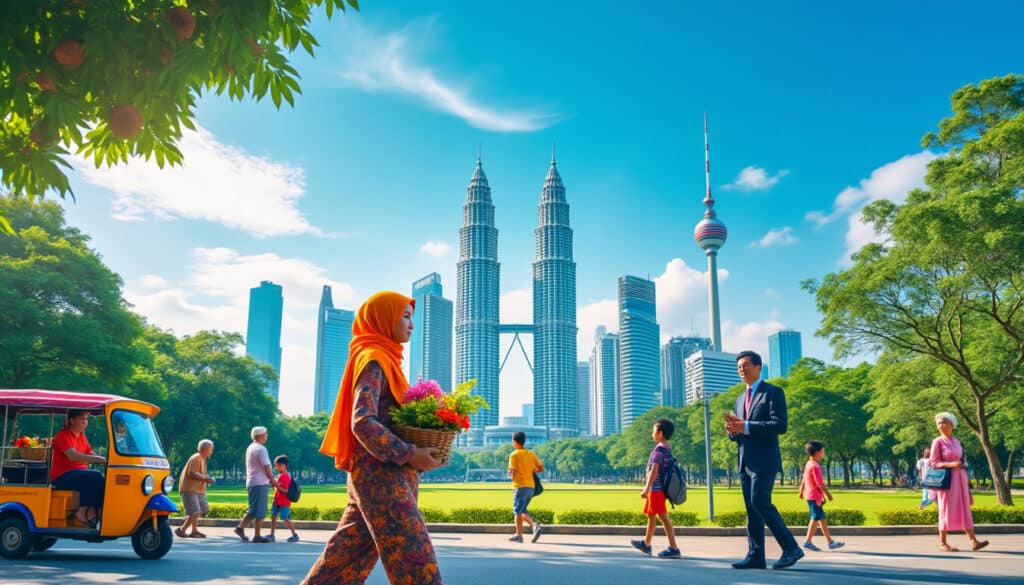
Demographics and geography of Kuala Lumpur
The demographics and geography of Kuala Lumpur present a vivid tapestry of cultures and landscapes, shaping this vibrant capital city of Malaysia. Renowned for its cultural diversity, Kuala Lumpur, or simply “KL”, stands as a beacon of Malaysia’s rich history…
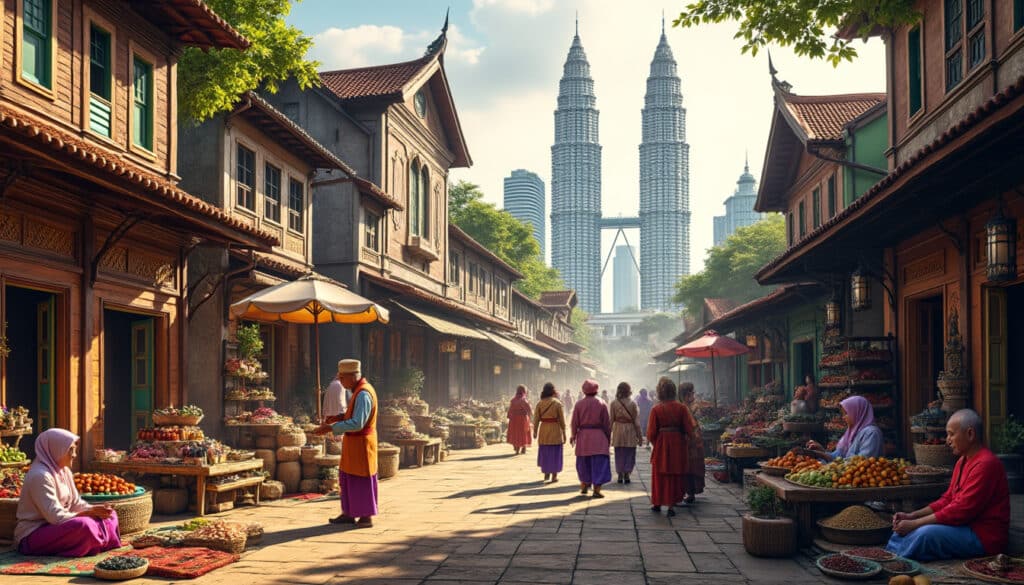
The enthralling tale of Kuala Lumpur’s evolution is akin to a tapestry woven with threads of determination, diversity, and dynamic growth. Once a mere jungle backwater, this city, nestled amid the confluence of the Klang and Gombak rivers, has metamorphosed…
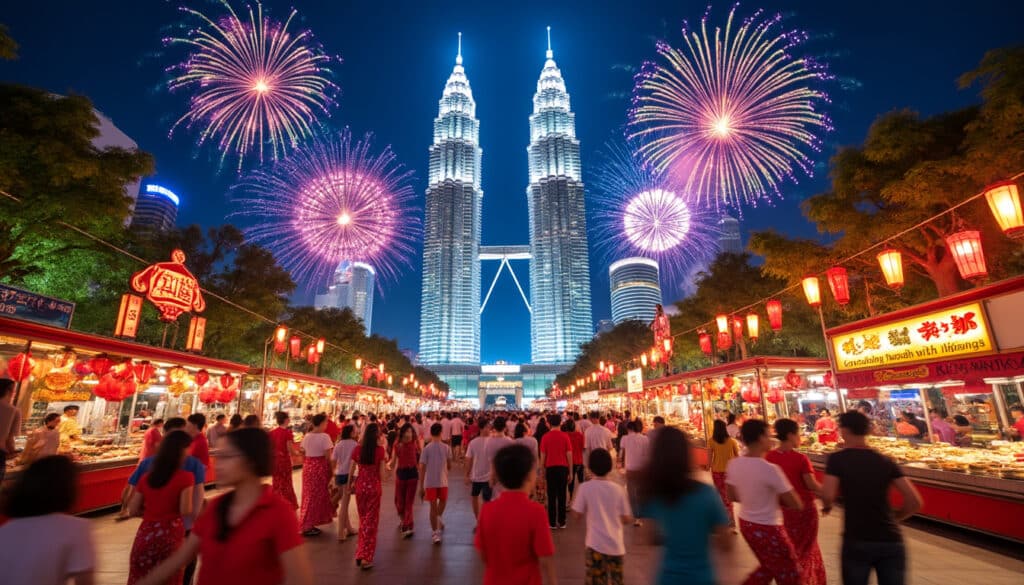
Holidays and celebrations in Kuala Lumpur
Kuala Lumpur is a city renowned for its vibrant celebrations and rich cultural tapestry. As the heartbeat of Malaysia, it hosts a plethora of holidays and festivities that attract both locals and visitors alike. With its diverse blend of Malay,…
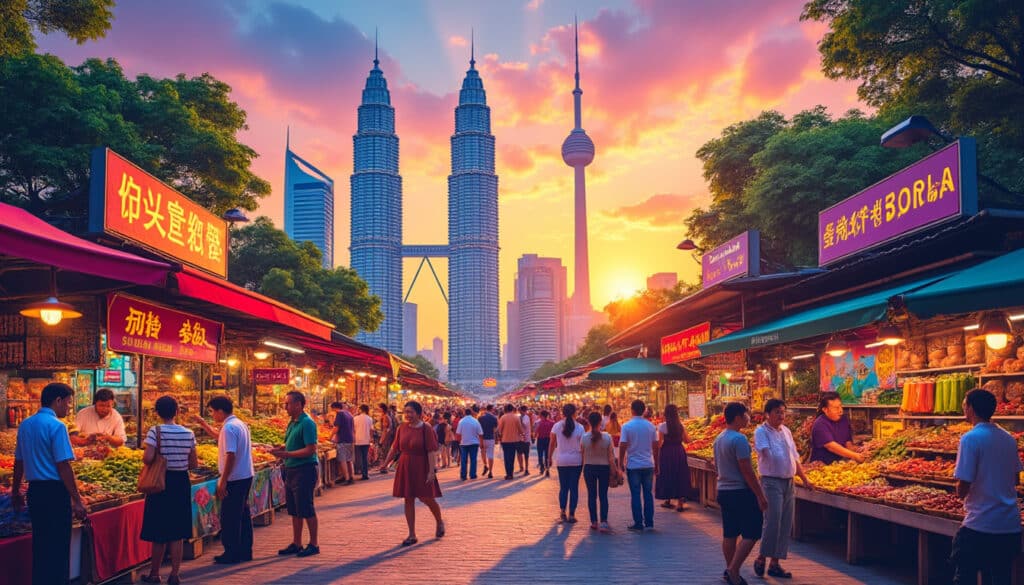
Language and spelling of Kuala Lumpur
Dive into the bustling streets of Kuala Lumpur, and you’re engulfed in a symphony of languages reflecting the city’s rich multicultural tapestry. From the austere Bahasa Melayu to the vibrant chimes of Mandarin, each language contributes distinctively to the fabric…
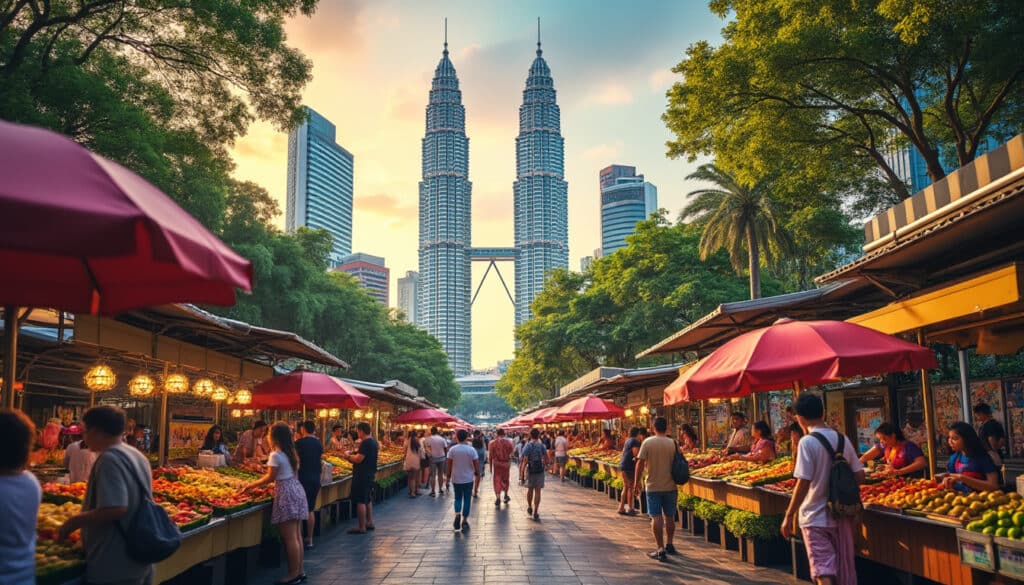
Local tips for tourists in Kuala Lumpur
Visiting Kuala Lumpur offers a unique blend of cultural diversity, vibrant city life, and historical richness. Whether exploring bustling markets, savoring local delicacies, or marveling at impressive landmarks, visitors will find an abundance of experiences. Embrace the city’s warmth and…
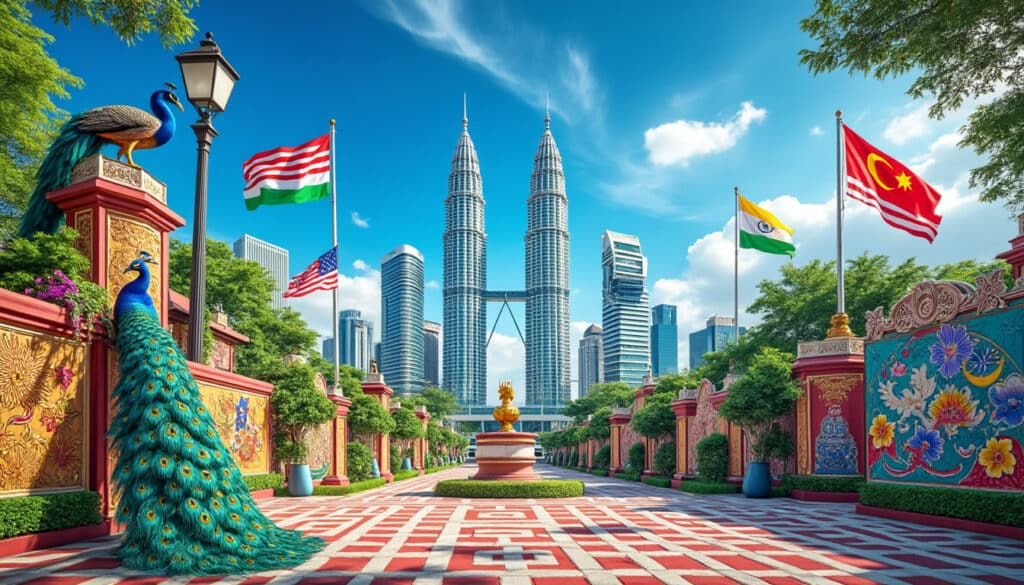
Names, flags, and identity of Kuala Lumpur
The vibrant city of Kuala Lumpur is a melting pot of cultural nuances, intricate flags, and a rich tapestry of identities that reflects its journey from a small tin-mining settlement to a bustling metropolis. As you walk through its streets,…
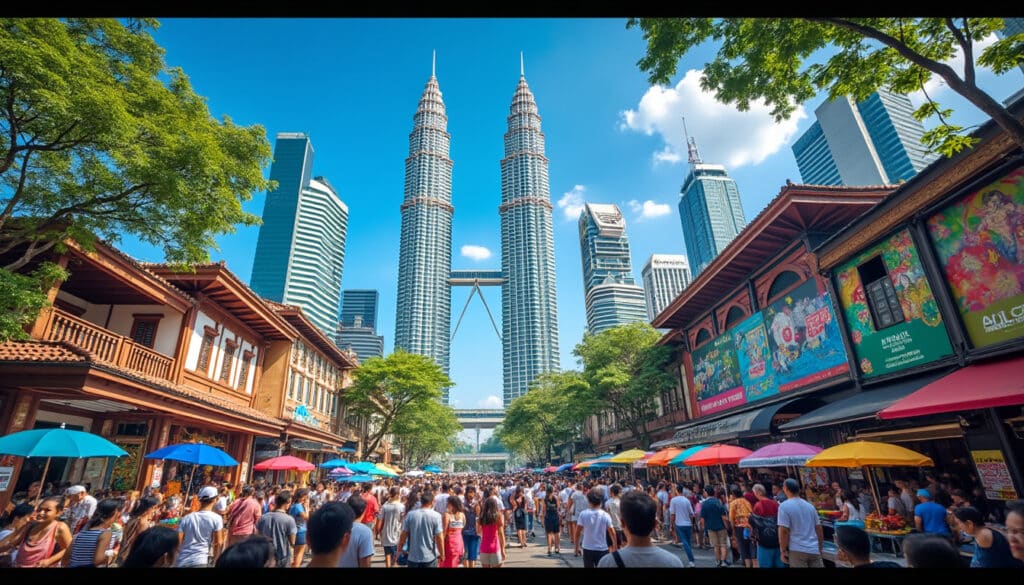
Reputation and identity of Kuala Lumpur
Kuala Lumpur, the bustling capital of Malaysia, is renowned for its unique blend of tradition and modernity. Often abbreviated as KL, this vibrant city stands as a testament to Malaysia’s rich cultural heritage and continuous urban development. From its iconic…

Time and time zone in Kuala Lumpur
Kuala Lumpur, Malaysia’s bustling capital, is not just a hub of vibrant culture and bustling street life; it is also a city intricately connected to its time zone, Maritime Time (MYT). Nestled in the GMT+8 zone, Kuala Lumpur lives by…
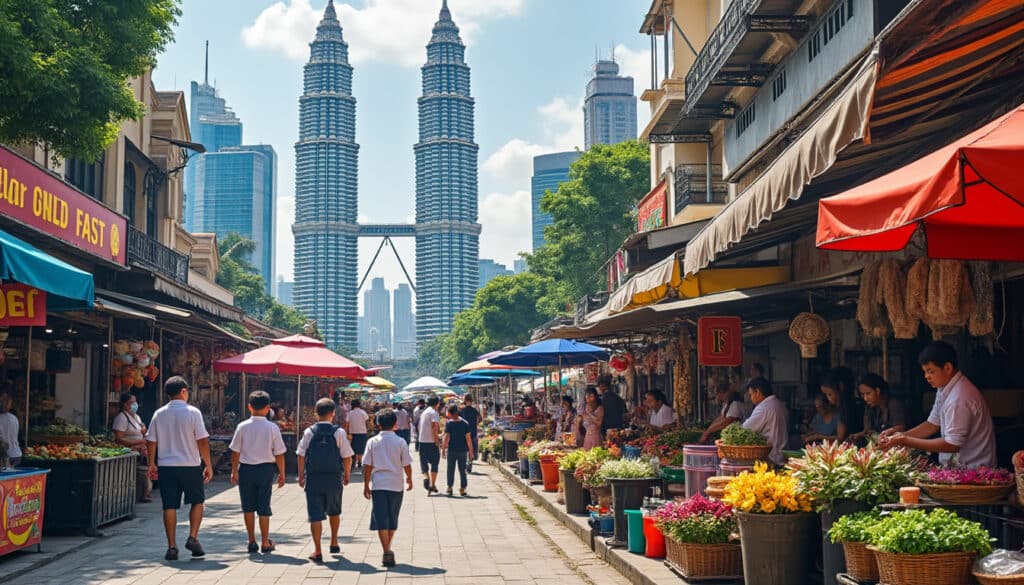
Unusual facts and social issues in Kuala Lumpur
Nestled in the heart of Malaysia, Kuala Lumpur is a city of contrasts, where the ancient mingles with the ultra-modern and diverse cultures blend seamlessly. Known for its iconic Petronas Twin Towers, bustling street markets, and vibrant nightlife, the city…
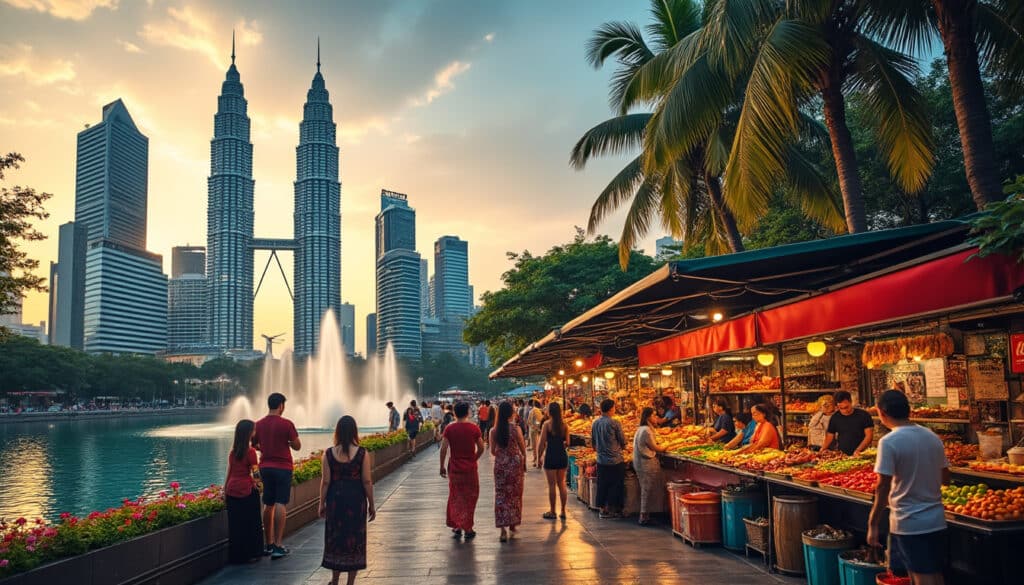
What does Kuala Lumpur look, smell, feel like?
Nestled between the hustle of thriving city life and the whispers of heritage that sing through its landmarks, Kuala Lumpur is a sensory tapestry that invites exploration. Whether you’re wandering through hidden alleyways or soaking in the skyline from afar,…


